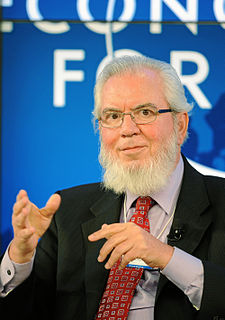A Quote by Mario Monti
In the area of macroeconomic policies, I think we'll see more centralization, like in the budgetary sphere.
Related Quotes
We naturally assume that our mental structures are universal. But I suppose an outside biologist looking at us would see something very different. He would see that, like other organisms, we have a narrow sphere within which we are very good, but that sphere is very limited. And that, in fact, the very achievements we can have within that sphere are related to lack of achievements in other spheres.
The budget caps were busted, mightily so. And we are reviewing with people like Judd Gregg from New Hampshire and others some budgetary reform measures that will reinstate - you know, possibly reinstate budgetary discipline. But the caps no longer - the caps, I guess they're there. But they didn't mean much.
I think you might see us growing much deeper into banking. You might see us acquiring companies in the banking area. You might see us acquiring companies in the retail area. I think you might see us acquiring companies in the telecommunications. I think you will see us getting stronger in business intelligence.
Oil policy, policy toward the United States, policy toward Iran, Bahrain, Yemen, very unlikely, I think, to see significant change. These policies were the policies that had a wide family consensus. The question I think would be if the king becomes sick, whether you have weak Saudi leadership in the Arab world and the Middle East rather than strong Saudi leadership, but I think the fundamental policies will continue, the ones we’re familiar with under King Abdullah.
From the rocket we can see the huge sphere of the planet in one or another phase of the Moon. We can see how the sphere rotates, and how within a few hours it shows all its sides successively ... and we shall observe various points on the surface of the Earth for several minutes and from different sides very closely. This picture is so majestic, attractive and infinitely varied that I wish with all my soul that you and I could see it.
The French need a thrashing. If the Prussians win, the centralization of state power will be useful for the centralization of the German working class. German predominance would also transfer the center of gravity of the workers' movement in Western Europe from France to Germany, and one has only to compare the movement in the two countries from 1866 until now to see that the German working class is superior to the French both theoretically and organizationally.
It should be possible to emphasize to students that the level of employment is a macroeconomic issue, depending in the short run on aggregate demand and depending in the long run on the natural rate of unemployment, with microeconomic policies like tariffs having little net effect. Trade policy should be debated in terms of its impact on efficiency, not in terms of phoney numbers about jobs created or lost.
The president has largely taken a hands-off approach in Syria and granted it as a legitimate sphere of interest to countries like Iran and like Russia. This is very bad policy, and it's going to lead to very dangerous consequences for our partners in the region, which is why so many of them are so opposed to U.S. policies.



































